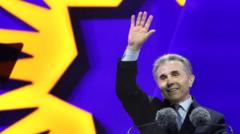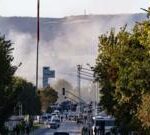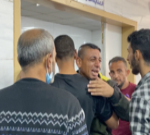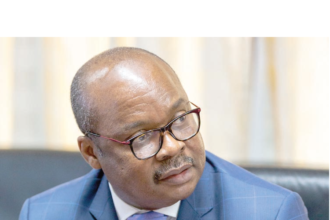Georgia’s ruling party holds mass rally ahead of crucial vote
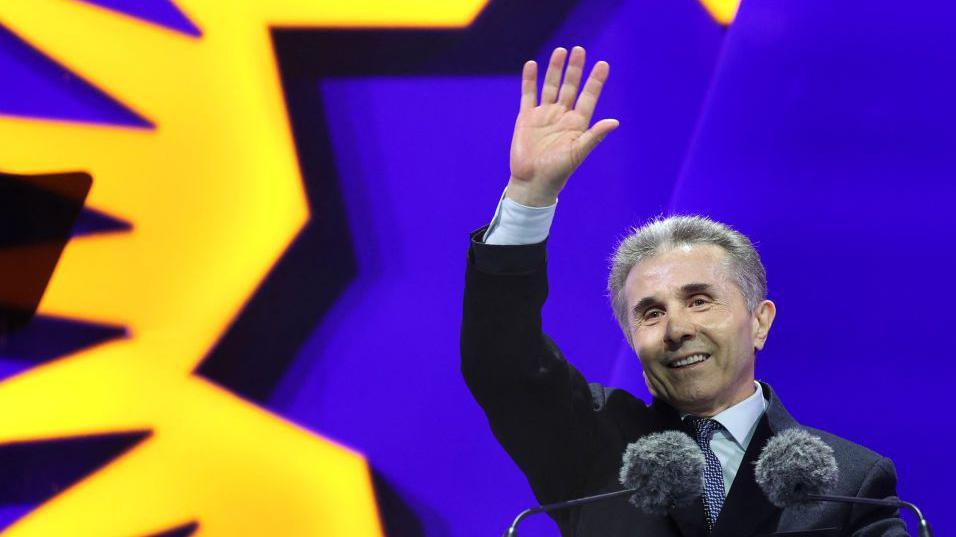
Georgian Dream’s founder Bidzina Ivanishvili is under pressure from four opposition groups
Reporting from
Tbilisi, Georgia
Three days before Georgians vote in an election billed as a decisive moment in their country’s future, the founder of the governing Georgian Dream party has told thousands of supporters “we choose peace, not war”.
After 12 years in government, Bidzina Ivanishvili’s Georgian Dream faces a close race against four opposition groups to cling on to power in this Caucasus state.
His party accuses the opposition of aiming to drag Georgia into involvement in the war in Ukraine, but the opposition argues the election is a choice between Russia under Georgian Dream, or Europe.
Ivanishvili, seen as Georgia’s most powerful figure, told the crowd in Liberty Square that they should have “a dignified European future based on equality”.
Georgians overwhelmingly back joining the European Union, but the EU froze that process this year amid stinging accusations from Brussels that the government was backsliding on democracy.
The party is accused by the opposition of sabotaging Georgia’s bid to join the EU, even though Georgian Dream insists they are still on course to do so by 2030.
Opinion polls in Georgia are not considered reliable, but the latest survey suggests that Georgian Dream will win the race, but that the four opposition parties combined would beat them.
Image source, GIORGI ARJEVANIDZE/AFP
On Tuesday it was Georgian Dream’s chance to fill Liberty Square in Tbilisi
Last Sunday, the opposition filled Liberty Square and surrounding streets with supporters waving Georgian and EU flags.
This time it was Georgian Dream’s turn, as a group of supporters waving Georgian and party flags marched towards the stage chanting “Long live Georgian Dream”.
Ivanishvili, the party’s billionaire founder and honorary chairman, addressed the crowd behind protective glass.
Tbilisi Mayor and Georgian Dream general secretary Kakha Kaladze echoed his message, accusing “so-called friends of Georgia” of directly interfering in Saturday’s forthcoming elections: “We refuse to be anyone’s vassal, following the wishes of others.”
Those words may not win hearts and minds in Tbilisi or the other main cities of Georgia – a country of about 3.5 million people. But it is a different story in the regions and rural areas.
“I don’t like Georgian Dream, but I hate the [former governing party] National Movement – and at least we’ll be at peace,” said Lali, a 68-year-old voter north of Tbilisi.
Georgians remember vividly a five-day war with Russia in 2008, when the National Movement was in power, and 20% of the country remains occupied.
However, concerns have been raised about fairness in this election. There have been reports of public servants, teachers and firefighters being intimidated into voting for the government.
“They’re threatened that they might lose their job… saying everybody will find out who voted for whom,” said Vano Chkhikvadze, EU Integration Program Manager at the Civil Society Foundation. “This works especially in the regions – these are small communities and everyone knows everyone there.”
The National Movement (UNM) makes up the biggest of the four opposition groups and Ivanishvili has called for it to be banned, along with anyone else in the opposition seen as “the enemy of the people and the enemy of the country”.
Georgian Dream (GD) has already pushed through two big laws widely criticised by the West. Earlier this month, the party’s speaker of parliament signed into law an anti-LGBT law, defying pro-Western president Salome Zurabishvili who had refused to do so.
And in May a Russia-style “foreign agents” law targeted foreign funding of media and civil rights groups, in the face of mass protests in Liberty Square and nearby parliament.
Zurabishvili has called on Georgians not to “be afraid”. Speaking on opposition-supporting Formula TV, she said they should vote for opposition parties who had all signed up to an action plan to join the EU.
Georgia has become so polarised that bigger, government-supporting TV channels give one story, and the opposition channels tell another.
Georgian Dream maintains it is still on course to join the EU. It has even adapted the EU’s 12 golden stars into its own blue star logo, regardless of the EU freezing Georgia’s application to join.
But one of its election posters is far more sinister, showing six opposition leaders, all held on a leash above the message: “No to war, no to agents.”
“No to war, no to agents” is the message beneath pictures of six opposition leaders
It fits in with the overall GD rhetoric of shady figures in the West – described as “the global war party” – pushing Georgia to war, and the opposition doing the West’s bidding.
Georgian ex-ambassador to the EU Natalie Sabadnadze has suggested the governing party appears to be pursuing a Viktor Orban-style Hungarian model with the message of peace with them – or war with the opposition.
“Georgian Dream wants an absolute majority to dismantle the system and do it legally – like Hungary. But they shouldn’t get one,” she believes.


